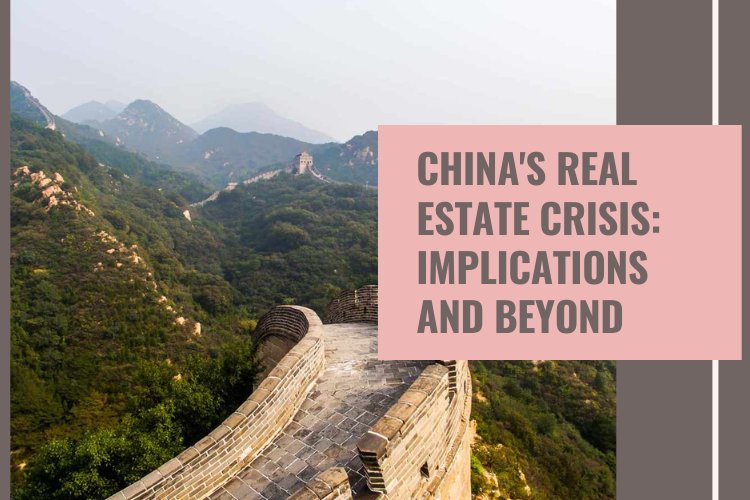China's Real Estate Crisis: Implications and Beyond
An in-depth look into the ongoing property crisis in China, exploring its roots, impact on the global stage, and potential solutions. A situation with global consequences, from social unrest to financial instability.

China's Real Estate Crisis: Implications and Beyond
The numerous vacant construction sites, dilapidated apartment buildings, and commercial centers throughout China are proof that the country's real estate market is in a serious crisis. These visible signs highlight the precarious state of the sector, which has caused widespread concern around the world. In the early 2000s, when a construction boom coincided with widespread expectations that property values could only rise, we saw the seeds of the current disaster. But now that the housing bubble has burst, there is widespread concern about another crash.
The goal of this article is to provide a comprehensive analysis of the current real estate crisis in China, including its causes, effects, global significance, government response, and proposed remedies. We'll highlight the many facets of this crisis, from the struggle for financing and policy overhaul to the far-reaching global implications, ranging from social upheaval to financial instability.
The Building Boom and Bust That Sparked China's Housing Crisis
Early 2000s China experienced a construction boom due to rapid urbanization and strong economic growth, which is where the country's current real estate crisis has its roots. The widespread belief that property prices would continue to rise due to the construction boom led to a speculative bubble.
But as so often happens with speculative bubbles, reality crept in. Due to rising prices and an oversupply of real estate, the real estate market reached unsustainable heights. The real estate bubble burst when this situation reached critical mass. Numerous unfinished construction projects and an oversupply of houses are the visible results of this burst bubble today.
China's Real Estate Crisis: Triggering Factors, Including the Financing War and the Impact of New Policies
The borrowing and construction frenzy in China's real estate industry has contributed significantly to the country's current housing crisis. Pre-sales were a major source of financing for developers, so the subsequent decline in sales affected their ability to pay current costs.
The Chinese government under President Xi Jinping has taken many measures to crack down on developers in the wake of the country's real estate crisis. This action was taken to restrict their access to finance and curb real estate speculation.
The insolvency of Evergrande, China's largest property developer, is also a major factor in the escalation of the country's real estate crisis. Evergrande's inability to meet its loans has fuelled concerns about the stability of the real estate market in the future. The default has exacerbated the already serious problems in the sector.
China's Real Estate Crisis and the Government's Financial Response
The Chinese government has taken a number of measures to stabilize the market and mitigate the effects of the real estate crisis. One of these measures is to encourage banks to maintain lending to developers in order to improve the current difficult economic climate.
The government has asked banks to lower mortgage rates to increase demand and make homeownership more affordable. The goal of these measures is to keep the market liquid and prevent a catastrophic collapse.
As trust companies struggle to make payments on their goods, the dangers to the financial system become more apparent. A collapse of China's real estate market could have far-reaching effects around the world, even though the country's banking system is likely more transparent and has more abundant sources of funding than Wall Street banks had during the 2008 global financial crisis.
The Global Consequences of China's Real Estate Crisis
The impact of China's protracted housing crisis could be felt far beyond the country's borders. First and foremost, countries that rely on China as a supplier or end user could feel the impact of a weakening Chinese economy. This could have far-reaching economic consequences and disrupt global supply systems.
The ownership issue could lead Beijing to reassess its competition with Washington and its approach to foreign policy. China's strategic goals could shift if its economy falters, leading to a major reassessment and potentially changing global dynamics.
It's clear, then, that China's real estate crash has far-reaching implications for the international economy, the political climate, and the monetary system as a whole, not just in China itself.
The Real Estate Crisis and its Impact on the Chinese Economy and Outlook
The real estate problem poses serious difficulties for the Chinese economy and complicates its future prospects. Significant reforms and long-term remedies are needed to address the fundamental challenges that have contributed to the crisis.
The need to reduce the oversupply of housing in some cities and areas is a major obstacle. The only way to ensure that such crises do not recur is through careful inventory management and smart urban planning.
The government must also strike a balance between promoting a stable real estate market and protecting against reckless speculation. The policies that shape the sector must continue to prioritize sustainable growth and development.
The impact of China's growing housing crisis could be felt far beyond the country's borders. The oversupply of homes and the resulting rise in vacant lots can be traced to the bursting of the real estate bubble that accompanied the construction boom. Even though the crisis is already challenging, governmental initiatives, financial strategies, and global effects have made it worse. Given the current crisis, the future of the Chinese economy requires serious consideration of the underlying structural problems and the need for long-term change. As the world watches events in China's real estate market, it is becoming increasingly clear that this crisis has far-reaching implications that threaten global economic stability and international relations.
Have fun trading!
Have a great journey, and may you catch some big waves on your way to prosperity!
To see this for real, click here.
https://www.myfxbook.com/members/SankarGanesan/tradefxp-trend-antitrend-day-trading/10404725
To read why you should be with us, click here
To open an account, click here.
To see our regulation certificate: click here.
To see our news with the IFMRRC: click here.
For claims, click here.
For the main site: click here.
For blogs and articles: click here.



 admin
admin 










